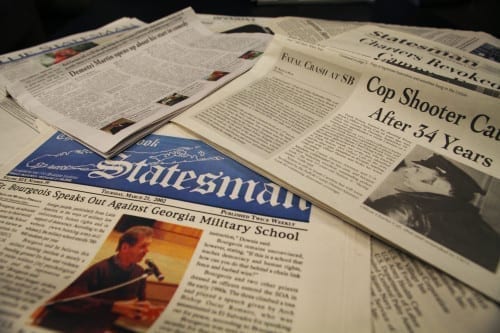
Steven Keehner, assistant opinions editor, is a junior journalism major with a minor in history.
How do you justify your desire to work in a dying industry?
That question should be the motto of every journalism school in America.
As I walk that much closer toward being tossed into an already-tossed-up industry, those words take up an extensive amount of space within my mind. The written word is facing a crisis that has been brewing for decades. Add a global pandemic into the mix, and the death of the local American newspaper is becoming harder to avoid.
So, with that considered, where does a 21-year-old reporter fit into the industry? One that not only faces increasingly difficult work conditions but also sees much of the population you intend to serve not even trust you?
Who knows? What I can explain is that the art of journalism takes on a much greater meaning when you consider this: Of all industries and occupations, there are none that exist more in serving the public’s interest than the reporter.
When looking beyond the realm of aspects like media ownership and other dilemma-raising issues, the intention of any reporter should come down to a simple idea: to inform and protect.
So when one who may not be as media literate sees a reporter retweet something that may not be “neutral,” it is understandable how this can raise questions of bias. Not that we should disconnect our readers from who we are, but on the flip side, we should allow them to see us for who we are: humans.
Yet, we need to be honest with ourselves as an industry and acknowledge that there are things we need to be doing better — not for survival, but to ensure that we accomplish the message I previously stated. Even from where I sit — still earning my stripes — there are some immediate goals we should strive for.
For starters, we know that my generation loves their smartphones. I’m not here to criticize that; I’d be lying if I said I didn’t wake up every morning and immediately scroll through Reddit or Instagram.
What I propose, instead, is to continue working toward a media world where our stories reflect a digital world. Not that it’s already happening, but let’s go further in doing so.
My personal hero, Jon Bois, the Innovation Editor for SB Nation, has gathered a cult following through his incredible ability to do this.
Through text, video, or a tweet, his intertwinement of the three has seen him create stories that don’t just meet the technological standards faced today, but one that still maintains the beauty of journalistic storytelling.
Speaking of his Twitter account, which (often) extends far beyond the realm of his work, it still sees him pull his audience in through just being himself, which ties into my second point.
If we’re going to rebuild lost trust with readers, we need to be more willing to pull the curtains back and reveal our thinking on why and how we cover stories.
Again, I won’t take credit for this thinking, but ideas often need to be repeated. One example that conveys this came from 2019 Pulitzer Prize Finalists, Deanna Pan and Jennifer Berry Hawes of The Post and Courier, for their feature piece, “An Undying Mystery: George Stinney”.
At the bottom of the first of five incredible parts, lies a box that says “Why Now?” In a paragraph, it explains the story’s relevancy and importance 74 years after it happened.
These brief glimpses into our world can not only allow readers to understand how our field works but go into building a more accountable media scene.
By constructing a connection between content creators and consumers, it keeps both parties in check with one another. Those who don’t keep up with the news should have fewer reasons to point fingers at journalists who are attempting to spread “fake news” if they keep their motives clear.
Now, does a high school basketball game need an extra body of writing explaining how the sources were contacted and why it is important? Probably not. But allowing readers to understand why we choose to dedicate our time to certain stories and causes is essential. To state it frankly, I don’t know if the ball is in our court on this issue anymore.
The online and media world has come together as one. You can’t be a reporter without being on Twitter or without knowing how to use WordPress. Never has it been easier to get a glimpse into your favorite writer, athlete or celebrity’s life than right now.
One of my favorite plays, “Inherit the Wind,” a fictionalized account based on the 1925 Scopes “Monkey” Trial, features a character I adore: E. K. Hornbeck.
A smug, witty and judgemental columnist, Hornbeck’s role as a “chorus character” leads to the play’s funniest interactions. It’s also an interesting way of seeing what we as journalists can look like in the eyes of others. In all his dialogue, one interaction has always stuck with me:
E. K. Hornbeck: “Evolution is a tricky question, which is hungrier, my stomach or my soul? Hot dog.”
Bible salesman: “Are you an evolutionist? An infidel? A sinner?”
E. K. Hornbeck: “The worst kind, I write for a newspaper.”
So, what are we? Are we only the heroic watchdogs that they teach us in school to look up to and aspire to become? Or is there more Hornbeck in us than we’d like to admit?
The answer, like most things, is somewhere in the middle. But that doesn’t change our goal: to inform and protect. It also doesn’t make us bad reporters or storytellers, either. It’s a reflection that behind every want-to-be watchdog, there is a human in there, too.
If we want to continue to tell stories, we need to adapt and change. But rather than straying from our roots, we should reconsider why they were planted in the first place.


















